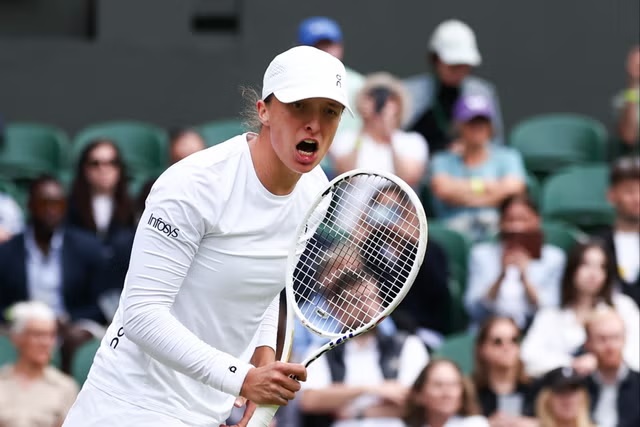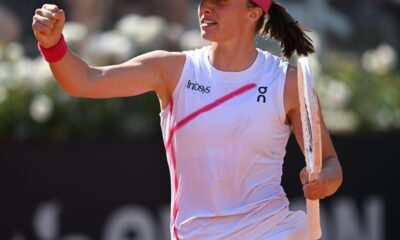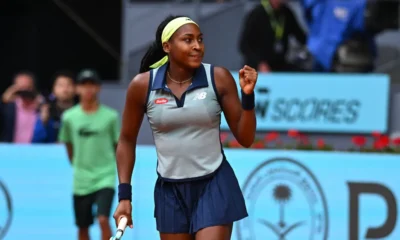TENNIS
Do You Think Telling Iga Swiatek How To Play Tennis Is Right?

There is no shortage of examples of Iga Swiatek being told how to play, how to behave or even how to wear her hat.
‘It’s an opinions game,’ they’ll counter, the only problem being that when everyone has a view, about virtually everything, what currency do they hold? Facts are sacred, of course, and Swiatek is indisputably a five-time grand slam champion, aged just 23.
Perhaps things reached a nadir when Jimmy Arias, a one-time grand slam semi-finalist, got particularly piqued about Swiatek’s peak. “I don’t think she’s been great for women’s tennis,” he fumed. “She wears her hat so low that you can’t even see her face or her eyes during a match, I want to see her personality.” Mansplaining With Jimmy or Talking Out His Arias, downloadable soon from wherever you get your podcasts.
Since time immemorial, women players – especially confident and outspoken ones – have been at best sidelined, at worst shamed, over how they look or what they wear. Swiatek, unsurprisingly, has a well-tuned filter to opinions of those outside her trusted inner circle, which only means she can be unfairly written off as aloof or arrogant.
However, she remains honest and open, even when it gets her into trouble. Not bad for a sport in a perpetual search for ‘personalities’. When asked about the recent decision of French Open organisers to rarely schedule women in primetime night matches, she responded: ‘I don’t care.’ No trite words, no dodging the question, just an honestly held view. Agree or disagree with the sentiment, it was refreshing.
Four years after the world No 1’s first slam title, critics still claim she must change her style of play if she is to become a truly generational star – the one many predict. “Ever since I’ve started my journey with sports, I’ve heard other people’s expectations on how I should play, how I look, how I should behave, what I should do,” she said. “I never liked to close myself within certain limits, I wanted to base my beliefs and experiences, my intuition.
“To me, self-confidence means courage, among other things. Courage in trying new things and not giving up even after making a mistake, courage in being sensitive and expressing emotions. There are no rules in a game.”
Swiatek has won four of the last five tournaments at Roland Garros and will start as red-hot favourite for the Olympics there, but the top seed’s Wimbledon record remains a work in progress. In five appearances, she has won 11 matches, her best return a defeat in last year’s quarter-final.
Her second-round rival, Croatia’s Petra Martic, is also not a lover of the green stuff. And Wimbledon’s sometimes faulty AI predictor gave her just a seven per cent chance of winning. That was perhaps a little unfair, but Swiatek was always value for her 6-4 6-4 win. With a shout of “Come on,” she brought up three match points but needed just one to ink her place against Yulia Putintseva in the third round.
In the past, it’s been around this stage where she has started to struggle, but her grand slam consistency is noteworthy: She is the only woman to reach the last 32 or better in every major this decade, 18 tournaments and counting.
“I’m happy to play in a solid way,” Swiatek said. “I felt like I had control in most of the games when Petra served, but I couldn’t really break it. I’m happy that I broke twice. That was a necessary thing to do to win these sets. I’m happy that I’m in the next round.
“I’m kind of doing everything step by step, and every match matters for me. It’s not like I’m going in the first rounds of grand slams knowing that I should win or I should take it for granted. I’m ready to battle even in the first rounds. I’m happy that I;m consistent, for sure.”
Elena Rybakina, the women’s champion two years ago, is another much-criticised player, famously struggling to smile after her 2022 success. The beaten finalist, Ons Jabeur, joked: “I need to teach her how to celebrate.”
However, reserved works for Rybakina, although the fourth seed allowed herself a glimmer of a smile after her 6-3 3-6 6-3 win over Germany’s Laura Siegemund. “Tough” was her word of choice to describe it, indeed she said it four times in just 70 words.
It was tight for a time, but this was ultimately settled by her destructive ball-striking off both groundstrokes. Her game is perfect for this surface.
“It’s always tough to play against Laura and for some reason every time we play, it’s super windy on the court,” she said. “It’s been a tough one and I’m really happy that I managed to win. Hopefully the next match will be more solid from my side. It gives me confidence, but every match is different and every match is tough – even when I won in 2022, I had some tough matches.”
























